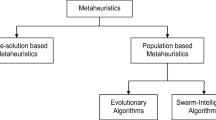Abstract
The existence of the curse of dimensionality is well known, and its general effects are well acknowledged. However, and perhaps due to this colloquial understanding, specific measurements on the curse of dimensionality and its effects are not as extensive. In continuous domains, the volume of the search space grows exponentially with dimensionality. Conversely, the number of function evaluations budgeted to explore this search space usually grows only linearly. The divergence of these growth rates has important effects on the parameters used in particle swarm optimization and differential evolution as dimensionality increases. New experiments focus on the effects of population size and key changes to the search characteristics of these popular metaheuristics when population size is less than the dimensionality of the search space. Results show how design guidelines developed for low-dimensional implementations can become unsuitable for high-dimensional search spaces.














Similar content being viewed by others
References
Kennedy J, Eberhart RC (1995) Particle swarm optimization. IEEE ICNN:1942–1948
Storn R (1996) On the usage of differential evolution for function optimization. EEE NAFIPS:519–523
Bellman RE (1957) Dynamic Programming. Princeton University Press, Princeton
Bratton D, Kennedy J (2007) Defining a standard for particle swarm optimization. IEEE SIS:120–127
Chu W, Gao X, Sorooshian S (2011) A new evolutionary search strategy for global optimization of high-dimensional problems. Inform Sci 181:4909–4927
Grefenstette JJ (1986) Optimization of control parameters for genetic algorithms. IEEE SMC 16(1):122–128
Shi Y, Eberhart RC (1999) Empirical study of particle swarm optimization. IEEE CEC:1945–1950
Zhang L-P, Yu H-J, Hu S-X (2005) Optimal choice of parameters for particle swarm optimization. J Zhejiang Univ Sci 2005 6A(6):528–534
Mallipeddi R, Suganthan PN (2008) Empirical study on the effect of population size on differential evolution algorithm. IEEE CEC:3663–3670
Dragoi E-N, Curteanu S, Leon F, Galaction A-I, Cascaval D (2011) Modeling of oxygen mass transfer in the presence of oxygen-vectors using neural networks developed by differential evolution algorithm. Eng Appl AI 24(7):1214–1226
Vafashoar R, Meybodi MR, Momeni Azandaryani AH (2012) CLA-DE: a hybrid model based on cellular learning automata for numerical optimization. Appl Intell 36(3):735–748
Hansen N, Finck S, Ros R, Auger A (2009) Real-parameter black-box optimization benchmarking 2009: noiseless functions definitions, INRIA Technical Report RR-6829
Liang JJ, Qu BY, Suganthan PN, Hernández-Díaz AG (2013) Problem definitions and evaluation criteria for the CEC 2013 special session on real-parameter optimization, Technical Report. Nanyang Technological University
Engelbrecht A (2012) Particle swarm optimization: velocity initialization. IEEE CEC:70–77
Helwig S, Branke J, Mostaghim S (2013) Experimental analysis of bound handling techniques in particle swarm optimization. IEEE TEC 17 (2):259–271
Storn R, Price K (1997) Differential evolution – a simple and efficient heuristic for global optimization over continuous spaces. J Glob Optim 11:341–359
Montgomery J, Chen S (2010) An analysis of the operation of differential evolution at high and low crossover rates. IEEE CEC:881–888
Montgomery J (2009 ) Differential evolution: Difference vectors and movement in solution space. IEEE CEC:2833–2840
Clerc M (1999) The swarm and the queen: towards a deterministic and adaptive particle swarm optimization. IEEE CEC :1951–1957
Jin’no K, Shindo T. (2010) Analysis of dynamical characteristic of canonical deterministic PSO. IEEE CEC:1105–1110
Nelder JA, Mead R (1965) A simplex method for function minimization. Comput J 7(4):308–313
Singer S, Singer S (1999) Complexity analysis of Nelder-Mead search iterations. Proc Appl Math Comput:185–196
Pham N, Wilamowski BM (2011) Improved Nelder Mead’s simplex method and applications. J Comput 3(3):55–63
Gao F., Han L (2012) Implementing the Nelder-Mead simplex algorithm with adaptive parameters. Comput Optim Appl 51(1):259–277
Kirkpatrick S, Gelatt CD Jr, Vecchi MP (1983) Optimization by simulated annealing. Science 220:671–680
Dueck G, Scheuer T (1990) Threshold accepting: A general purpose optimization algorithm appearing superior to simulated annealing. J Comp Phys 90(1):161–175
Talbi E-G (2009) Metaheuristics. Wiley Publishing, From Design to Implementation
(2009) Particle swarm optimisation and high dimensional problem spaces. IEEE CEC:1988–1994
Author information
Authors and Affiliations
Corresponding author
Rights and permissions
About this article
Cite this article
Chen, S., Montgomery, J. & Bolufé-Röhler, A. Measuring the curse of dimensionality and its effects on particle swarm optimization and differential evolution. Appl Intell 42, 514–526 (2015). https://doi.org/10.1007/s10489-014-0613-2
Published:
Issue Date:
DOI: https://doi.org/10.1007/s10489-014-0613-2




